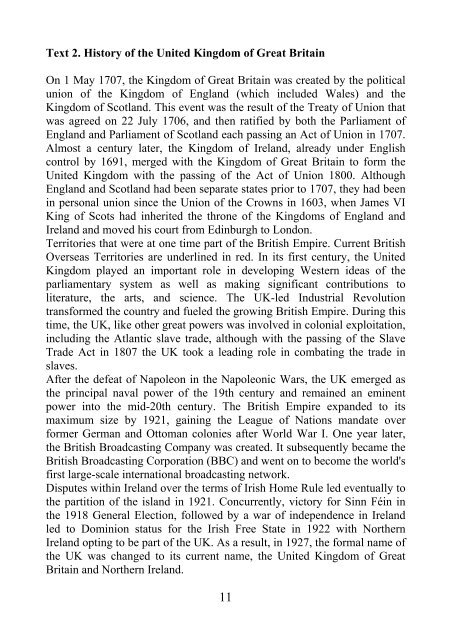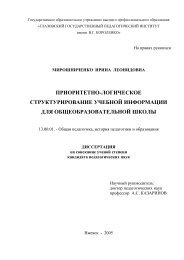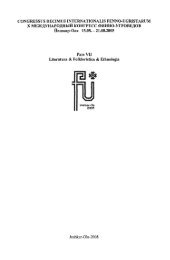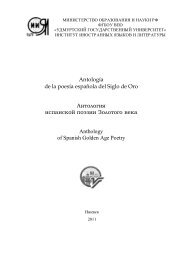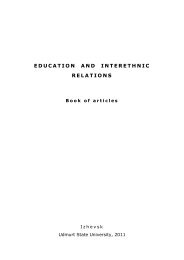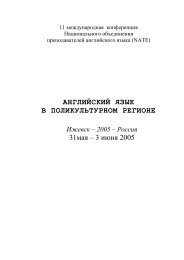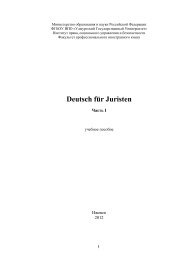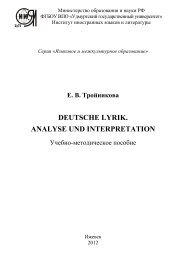Ð.Ð. ÐелинÑÐºÐ°Ñ ENGLISH-SPEAKING COUNTRIES
Ð.Ð. ÐелинÑÐºÐ°Ñ ENGLISH-SPEAKING COUNTRIES
Ð.Ð. ÐелинÑÐºÐ°Ñ ENGLISH-SPEAKING COUNTRIES
You also want an ePaper? Increase the reach of your titles
YUMPU automatically turns print PDFs into web optimized ePapers that Google loves.
Text 2. History of the United Kingdom of Great Britain<br />
On 1 May 1707, the Kingdom of Great Britain was created by the political<br />
union of the Kingdom of England (which included Wales) and the<br />
Kingdom of Scotland. This event was the result of the Treaty of Union that<br />
was agreed on 22 July 1706, and then ratified by both the Parliament of<br />
England and Parliament of Scotland each passing an Act of Union in 1707.<br />
Almost a century later, the Kingdom of Ireland, already under English<br />
control by 1691, merged with the Kingdom of Great Britain to form the<br />
United Kingdom with the passing of the Act of Union 1800. Although<br />
England and Scotland had been separate states prior to 1707, they had been<br />
in personal union since the Union of the Crowns in 1603, when James VI<br />
King of Scots had inherited the throne of the Kingdoms of England and<br />
Ireland and moved his court from Edinburgh to London.<br />
Territories that were at one time part of the British Empire. Current British<br />
Overseas Territories are underlined in red. In its first century, the United<br />
Kingdom played an important role in developing Western ideas of the<br />
parliamentary system as well as making significant contributions to<br />
literature, the arts, and science. The UK-led Industrial Revolution<br />
transformed the country and fueled the growing British Empire. During this<br />
time, the UK, like other great powers was involved in colonial exploitation,<br />
including the Atlantic slave trade, although with the passing of the Slave<br />
Trade Act in 1807 the UK took a leading role in combating the trade in<br />
slaves.<br />
After the defeat of Napoleon in the Napoleonic Wars, the UK emerged as<br />
the principal naval power of the 19th century and remained an eminent<br />
power into the mid-20th century. The British Empire expanded to its<br />
maximum size by 1921, gaining the League of Nations mandate over<br />
former German and Ottoman colonies after World War I. One year later,<br />
the British Broadcasting Company was created. It subsequently became the<br />
British Broadcasting Corporation (BBC) and went on to become the world's<br />
first large-scale international broadcasting network.<br />
Disputes within Ireland over the terms of Irish Home Rule led eventually to<br />
the partition of the island in 1921. Concurrently, victory for Sinn Féin in<br />
the 1918 General Election, followed by a war of independence in Ireland<br />
led to Dominion status for the Irish Free State in 1922 with Northern<br />
Ireland opting to be part of the UK. As a result, in 1927, the formal name of<br />
the UK was changed to its current name, the United Kingdom of Great<br />
Britain and Northern Ireland.<br />
11


